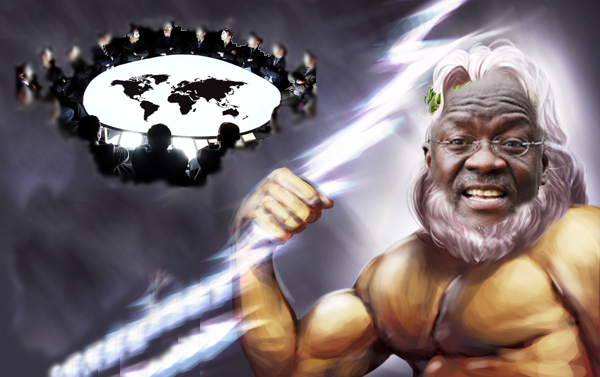 Tanzania’s president doesn’t so often follow the law as make it. The public doesn’t seem to mind. “He’s reducing corruption,” I often hear in his defense.
Tanzania’s president doesn’t so often follow the law as make it. The public doesn’t seem to mind. “He’s reducing corruption,” I often hear in his defense.
I’ve seen local police cower from motorists who are increasingly challenging their road stops. Clerks at national parks are subdued: The normal “chai” that greased palms is in short supply. Everybody fears that Magufuli will show up, fire them or worse, jail them.
But when “Magufuli Justice” was applied internationally, recently, it didn’t go so well.
Everywhere in the world there’s corruption. If you used measuring cups or cash registers to quantify it, the most corrupt place on earth is America. If “loop holes” are corruption, ditto for the States. Not to mention individual criminality, like those who nearly brought down the world not too long ago from their stretch limos on Wall Street.
But if you use any man’s daily routine, Africa probably wins the contest. Laws are so little understood and even less enforced, governments like Tanzania so mismanaged, that just to get your kid to school you probably have to bribe the matatu driver for a seat on the shuttle, the seamstress for the under available sweater uniforms, the shop owner for the better pencils, the pharmacist for the disappearing malaria medicine, the Headmaster just to let her in and then maybe even the teacher. At this point you might as well dish out some more for better grades.
Don’t generalize too much. Remember the many times I’ve explained why ExxonMobil is to blame: in a nutshell, it’s trickle down corruption.
So rich America has it mostly on the top and the poor rest of the world gets it down at the bottom, and President Magufuli will have none of it.
He behaves like Zeus, occasionally stepping off his cloud to disguise himself as a poor old citizen walking into a random store or government office and leaving behind a notebook of pink slips.
None of this is legal, of course, but the public lauds him for doing this. Fondly, they’ve nicknamed him “the bulldozer.”
Well into his second year the Bulldozer has decided these one-off sorties into the Tanzanian streets aren’t enough. In April he fired 10,000 civil servants all at once. Illegally, of course, but he’s also rearranged the courts willy nilly to support him.
Less than a month later he continued his purge of government employees by firing the country’s mining minister.
That’s big. Mining is Tanzania’s largest source of revenue. The country owns the second largest streak of gold in the world and yet to be calculated hunks of rare earths, uranium, titanium and who knows what else. To be sure this is where the country’s deepest corruption resides.
Although technically run by the world’s giant multinationals, the gold fields near Lake Victoria have never produced anywhere near capacity. Sometimes it’s because the multinationals resisted the wanton palms of government officials; at other times it’s because they greased them too much.
So spare parts don’t get into the country. Shipments don’t get out. Workers strike constantly.
So palpable applause resonated throughout the global arena when Magufuli sacked Minister Sospeter Muhongo with this odd comment, “I like Professor Muhongo very much … he is my friend, but I would like him to assess himself on this issue and vacate his position without delay.”
And immediately then sacked the chief executive of the mines and the head of the auditing department which I guess was the chef of the books.
Well, now what? This slayer of all-that-is-bad studied the new audit of all affairs mining and decided – perhaps accurately – that the real blame was with the Acacia Mining Company of Canada.
Acacia runs the mines. Indeed, if there was corruption, it couldn’t have happened without them, right? So Magufuli slapped Acacia – a wholly owned subsidiary of the world’s largest gold company, Barrick – with a back tax bill of $190 billion.
You know you got to realize that big numbers aren’t so startling in Africa. It takes a thousand Tanzanian shillings to buy a small glass of Coke. Before Zimbabwe imploded they were printing notes of $100 trillion Zimbabwean dollars. But of course, in Canada that was big money.
Gold mining has slowly come to a halt in Tanzania. Acacia’s stock has lost nearly three quarters of its value.
Meanwhile back at the International Court of Arbitration Tanzania was sacked with +$35 million fine for arbitrarily canceling (guess by whom) a contract with a Canadian company hired to build some Tanzanian roads.
Zeus threw down a few lightning bolts on that one, so the Canadian government then embargoed Magufuli’s prize purchase, new planes for Air Tanzania.
So what does this mean? Magufuli’s high-handed, clearly illegal style is wrong? Or that the world system is wrong?